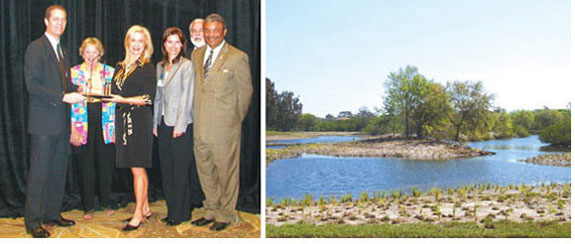 Scott Black, Dade City commissioner, presents Jennifer Closshey, Governing Board treasurer, with the award while Sallie Parks, Governing Board member; Jennette Seachrist, SWIM program manager; Manny Pumariega, Planning Council executive director; and Joe Jordan-Robinson, Northwest Hillsborough Basin Board vice chair, look on.
Scott Black, Dade City commissioner, presents Jennifer Closshey, Governing Board treasurer, with the award while Sallie Parks, Governing Board member; Jennette Seachrist, SWIM program manager; Manny Pumariega, Planning Council executive director; and Joe Jordan-Robinson, Northwest Hillsborough Basin Board vice chair, look on.
A project that is providing low-salinity fisheries habitat and improving water quality made waves at the Tampa Bay Regional Planning Council’s 15th Annual “Future of the Region” Awards.
The Lancaster Tract Habitat Restoration project received the first-place award in the environmental category.
A cooperative effort between the District’s Pinellas-Anclote River Basin Board, the District’s Surface Water Improvement and Management (SWIM) Program and Pinellas County, the project restored 14 acres along Allens Creek by creating four tidal marsh areas connected by the creek. It also involved creating a freshwater pond and enhancing the associated uplands habitat. The property is owned by Pinellas County and is located within Largo, a highly urbanized watershed.
The tidal marsh areas are dominated by smooth cord grass and are used by a variety of wading birds throughout the year, as well as manatees during the colder months. Cord grass is native to this area and provides food for wading birds by establishing habitat for juvenile fish and crabs. It also decreases the potential for erosion during storm events and takes up excess nitrogen in the water before it reaches Tampa Bay, the SWIM Program’s top priority water body.
The freshwater pond on the northeast portion of the site captures runoff from the surrounding neighborhoods, helping to improve water quality before it enters Allens Creek. In the past, this water flowed directly into the creek through a storm pipe. An existing freshwater pond on the southwestern portion of the site was also modified to provide additional stormwater treatment.
The project was extremely cost-effective due to the cooperation of a number of government partners.
“This is a great example of government agencies collaborating on a project to save money and protect the environment,” said Stephanie Powers, District environmental scientist. “Without participation from the District, Pinellas County and the City of Largo, this project would have cost thousands of dollars more or may not have been completed at all. Over the past year and a half, this site has become a bird-watcher’s paradise.”
The District’s Operations Department excavated the site and used new riprap to build up and protect the eroding shoreline.
Fill material from the site was trucked to the Brooker Creek Preserve and Eagle Lake Park, both managed by Pinellas County, for use in repairing and creating walking trails. The city of Largo agreed to store the remaining fill, which saved nearly $25,000 in trucking costs.
The District is currently carrying out a three-year exotic plant maintenance plan to minimize reinfestation. Pinellas County will be responsible for the long-term maintenance and operation of the site. The county may use the site as a passive park with a small foot trail as well as a canoe and kayak launch.
The total project cost was approximately $530,000, with funds provided by the District’s Pinellas-Anclote River Basin Board, SWIM and a state appropriation. Pinellas County provided the land for restoration.
Florida-Friendly Landscaping Earns Honorable Mention
The Tampa Bay Regional Planning Council recognized the District’s promotion of Florida-friendly landscaping with an honorable mention award in the Public Education category.
The District’s Florida-friendly landscaping programs show homeowners, builders and landscape professionals how to conserve and protect water resources while creating beautiful landscapes.
The District uses a multifaceted approach to promoting Florida-friendly landscaping, including media messaging, Florida Yards & Neighborhoods funding, outreach and education materials.
